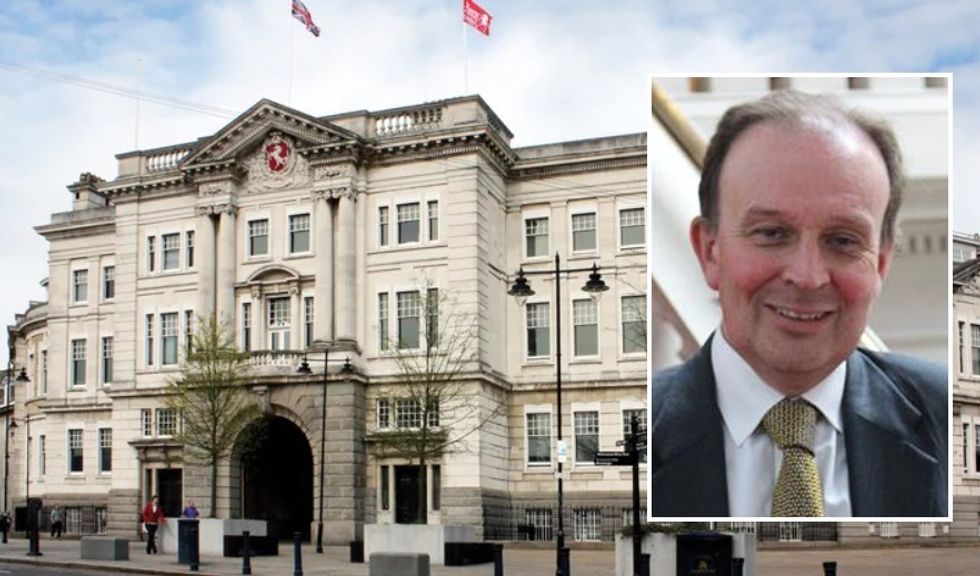Emily Carver is furious about several local councils increasing council tax by …
GBN
Government accused of ‘cherry picking’ urban councils for funding while rural areas are left behind
Don't Miss
Most Read
Trending on GB News
Four in five English County Councils feel Chancellor Reeves’ budget has left them in ‘worse position’ meaning increased council tax bills and cuts to public services, shock research has revealed.
The data, compiled by County Councils Network (CCN), has sparked concerns Labour is choosing urban areas over rural ones in their shakeup of how local government is funded.
Much of the concern emanates from the ‘Local Government Finance Settlement 2025/26’, which is effectively parliament deciding how much money will be given to local authorities and whether that money will be ringfenced.
The settlement has set out a £600million Recovery Grant, but it is heavily targeted towards urban and city councils in the North and Midlands.
Just 3 per cent of the Recovery Grant is going to county councils and other rural local authorities.
Furthermore, the £100m Rural Services Delivery Grant for 2025/26, which recognised the higher costs of delivering local authority services in rural areas, has been removed by Labour.
These moves have seen virtually all councils announce rises to council tax by the legal limit of 4.99 per cent. Some are asking for special permission to raise bills by up to 25 per cent, justified with the threat of bankruptcy.
CCN’s survey of their members (23 county councils and 13 county unitary authorities representing 25 million people), found almost one in three (31 per cent) say their cuts will be ‘severe’ following the Budget and Local Government Finance Settlement.
The research dug down into what services could be cut.
Headline findings - what could it mean for me?
- More than half of councils (51 per cent) are more likely to cut services in adult social care, such as care homes, home care, and support for voluntary and charity groups.
- Half (50 per cent) say they are now more likely to have to reduce eligibility for adult social care and school transport.
- Four in ten (42 per cent) say they are now more likely to turn off an increased amount of streetlights and reduce climate change initiatives (45 per cent) as a result of the government’s decisions.
- Over one in three (35 per cent) are now more likely to cut the number of libraries in their area or reduce their opening times.
- Despite the government announcing £515m in compensation for the employers’ National Insurance increase, not one council said their anticipated sum would cover all of their new costs.
The research is the latest in a series of a hammer blows to Labour’s claim to represent the interests of rural people, many of which voted for Starmer’s party for the first time in July 2024.
In recent weeks the claim has been tainted by Reeves’ inheritance tax on farmers and the removal of the winter fuel payment for millions of rural pensioners.
The CCN went as far as saying: “the government has taken a very secretive approach to its proposals in the Local Government Finance Settlement and has not published evidence on why funding is so targeted to a handful of councils.
It continued: “Ministers have said the funds are being distributed using a formula that accounts for deprivation, but this has very serious technical deficiencies and was not consulted on prior to its introduction.
“The government has also recently launched a fair funding review, which will make permanent changes to the distribution of central government funding to councils and is due to be concluded later this year.
“The government’s proposals in the Local Government Finance Settlement sets a worrying precedent that the fair funding review may not be evidence-based and could result in county authorities losing hundreds of millions in government funding.”
This would explain why the CCN’s survey found County Councils’ confidence in their ability to balance their books while Labour is in charge to be very low.
Indeed, just one council is confident of setting a balanced budget by 2029/30 (when the next general election is due), while six in ten (60 per cent) are not confident.
Every single council responding to the CCN survey said they thought the government does not properly recognise demand and service pressures in county and rural areas.
The CCN added: “We call on the government to publish the evidence that backs up its ministers’ decisions to target funding to urban and city councils, and the forthcoming Fair Funding review must be transparent, and based on clear and comprehensive evidence.”
LATEST FROM MEMBERSHIP:
 Roger Gough, the leader of Kent County Council, which has 28 employees taking home more than six figuresKent County Council
Roger Gough, the leader of Kent County Council, which has 28 employees taking home more than six figuresKent County CouncilCllr Barry Lewis, Finance Spokesperson for the County Councils Network, said: “The Local Government Finance Settlement will be a disappointing one for the majority of county and unitary councils, and sets up a difficult twelve months for those authorities.
“With the government choosing to heavily target its £600m ‘Recovery Fund’ to local authorities covering major cities and towns at the expense of county areas, just 3% of this grant will go to County Councils Network (CCN) councils.
“Compounding this is the increase in the National Living Wage and employers’ National Insurance, with the costs of these policies outweighing any additional funds made available in this finance settlement for county and unitary councils.
“Consequently, more than four in five CCN members say they are in a worse position than before the Autumn Budget and this finance settlement, and one third say their service reductions next year will now be severe.
“Considering there is very little fat left to cut from many of these services already, a further reduction will have a material impact on our residents.
“It is important that decisions made in the finance settlement and the manner in which they have been made does not set a precedent ahead of the upcoming fair funding review.
“There has been nothing published so far that backs up ministers’ decisions to target funding so specifically by exclusively using deprivation within the funding formula, so it is imperative the fair funding review is carried out transparently.
“Whilst deprivation is a reason some councils’ costs are high, it is not the sole reason.
“The CCN’s evidence shows to demand and market failure across adult and children’s social care and special educational needs services are the main reasons as to why councils across all four corners of the country are struggling.
“If the trend of this finance settlement does continue, the government will completely understate the very real financial pressures faced by councils outside of towns and cities and it will push many county and unitary councils to the brink.
“The Local Government Secretary’s written statement today also references ending the ‘two-tier’ premium paid by taxpayers in county areas and mending this broken system.
“If the government is to achieve its aim of streamlining local government, reform must be at the correct scale to make a difference to public services and to generate efficiency savings.
“That means building on the principle of new unitary councils covering populations of 500,000 people or more.”
An MHCLG spokesperson said: “We recognise the challenges that all local authorities are facing as demand increases for critical services, which is why we are injecting over £69 billion into council budgets across the country as we continue to fix the foundations of local government through wider long-term reform.
“No council will see a reduction and places with a significant rural population will on average receive almost a 6 per cent increase in their Core Spending Power next year, which is a real terms increase.”







